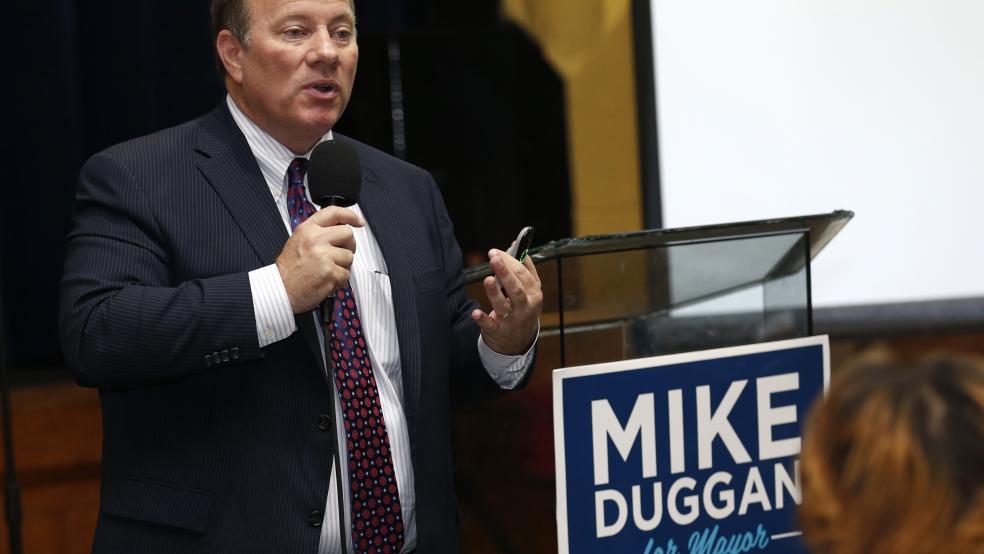There was a time when Benny Napoleon might have been a shoe-in to win election as mayor of Detroit.
 An old-school Democrat with an easy way about him, Napoleon rose through law enforcement ranks to become the city’s police chief before moving on to a job in the Wayne County executive’s office and finally election as sheriff.
An old-school Democrat with an easy way about him, Napoleon rose through law enforcement ranks to become the city’s police chief before moving on to a job in the Wayne County executive’s office and finally election as sheriff.
With decades of administrative experience and deep ties to Motown’s black community and churches, Napoleon was a natural to run for mayor after the incumbent, former NBA great Dave Bing, announced earlier this year that he would not seek a second term.
RELATED: RACIAL POLITICS JUST GOT HOTTER IN DETROIT
Yet Napolean’s bid to perpetuate African American politicians’ 40-year hold on the mayor’s office was stopped cold by the worst municipal financial crisis in U.S. history. The city is $18 billion in debt; its unfunded pension and health insurance programs are out of control; and a Republican governor appointed Kevyn Orr, a former bankruptcy lawyer, to lead the city through bankruptcy proceedings and restructure or shed billions in debt.
On Tuesday, voters elected Mike Duggan, a former prosecutor and hospital administrator with a proven record as a financial turn-around artist, as mayor over Napoleon. Duggan is the first white politician to claim the mayor’s office since the early 1970s.
Fed up with years of public mismanagement, corruption and scandals and fearful of their futures in a new era of austerity, Detroiters abruptly changed course and threw out the old political playbook.
Duggan defeated Napoleon 55 percent to 45 percent in a light turnout of less than 20 percent of Detroit voters, according to city officials.
"At this moment what we have in common is much more powerful than what divides us," Duggan said at his victory celebration last night. "And now the real work begins."
Explanations abound as to what led to the election of the 55-year-old Duggan, who miraculously finished first in the August primary with a write-in campaign after getting bumped from the ballot.
Duggan waged a sophisticated neighborhood by neighborhood campaign and media strategy that drew strong backing from the metropolitan Detroit business community. More importantly, experts say that voters’ economic self-interest ultimately trumped racial identity and the city’s long-standing political polarization in the city.
A HISTORY OF RACIAL POLITICS
Detroit’s politics have long been dominated by blacks dating back to the rise of Coleman Young, a one-time labor leader who began a 20-year reign as mayor in 1974, after riots and the flight of whites to the suburbs gradually changed the city to majority black. Young’s successors ranged from a former Michigan State Supreme Court justice to a prominent lawyer to a former state representative, Kwame Kilpatrick, who was forced to resign in 2008 after pleading guilty to two counts of obstruction of justice.
RELATED: DETROIT’S 60-YEAR DECLINE INTO BANKRUPTCY HELL
Bing, a former Detroit Pistons star and businessman, was elected in 2009 by vowing to fix the financial mess and convert tens of thousands of abandoned buildings and empty lots into farmland. But he was overwhelmed by the extent of Detroit’s financial problems and largely pushed aside by Orr, the city’s temporary overseer.
In the wake of a surprisingly strong victory in Detroit’s Aug. 6 primary, Duggan led Napoleon by nearly 2-1 among voters just six weeks before the election, according to a Free Press/WXYZ TV poll. The survey interviewed 400 likely voters, 79 percent of whom were African American. Remarkably, 86 percent of the respondents said Duggan’s race would not be a factor in their decision on whom to support.
Duggan was suspect at first for having lived in suburban Livonia for years before moving back to his hometown of Detroit last year, and because of his ties to business. Nevertheless, he convinced voters that he had the experience and smarts to guide the city beyond the bankruptcy proceedings – when Orr is likely to depart.
“He built a reputation for being a turn-around artist – a Mr. Fixit who can get things done in both the private and public sector,” Bill Ballenger, founder of Inside Michigan Politics, publication, said in an interview Tuesday. “And I think Detroiters are exhausted after four decades of slide into fiscal chaos and broken city government for somebody who offers at least a prospect of change and reform.”
RELATED: DETROIT’S BANKRUPTCY IS A BIG RED FLAG FOR OTHER CITIES
“I don’t think Benny Napoleon has been able to make the case that he is any better—and maybe not as good—as some of the black candidates who have run and were elected before,” he added.
A HEALTHY PORTFOLIO
Duggan, a one-time Wayne County prosecutor, is widely credited with leading Detroit Medical Center, the city’s largest employer, to profitability after the facility lost a half-billion dollars over five years.
As CEO, he arranged for the hospital’s sale in 2010 to Vanguard Health Systems, a private, Tennessee-based hospital company that pumped more than $1.5 billion into its operations. Duggan was among Michigan’s highest-paid health care executives. Before he stepped down late last year to run for mayor, he was receiving more than $2.4 million--including stock options—from Vanguard Health Systems, according to the Detroit Free Press.
During the 1990s, while serving as an aide to the Wayne County executive, Duggan took control of the financially ailing regional bus system and helped eliminate a large budget deficit while improving services, according to media reports.
Stephen Henderson, editorial page editor of the Free Press, endorsed Duggan: “He’s clearly the more accomplished candidate – a record of turnarounds, a vision that will focus on management and accountability in the mayor’s office.
At the same time, Henderson chastised Napoleon for trying to play the race card during the campaign. “Napoleon has had many chances to lean and impress, but has never really delivered,” Henderson wrote.





